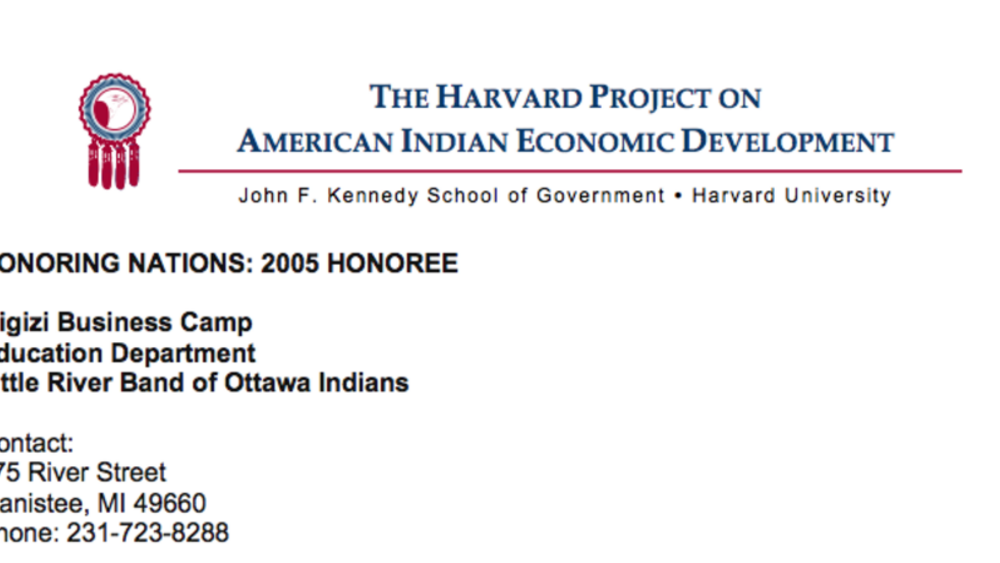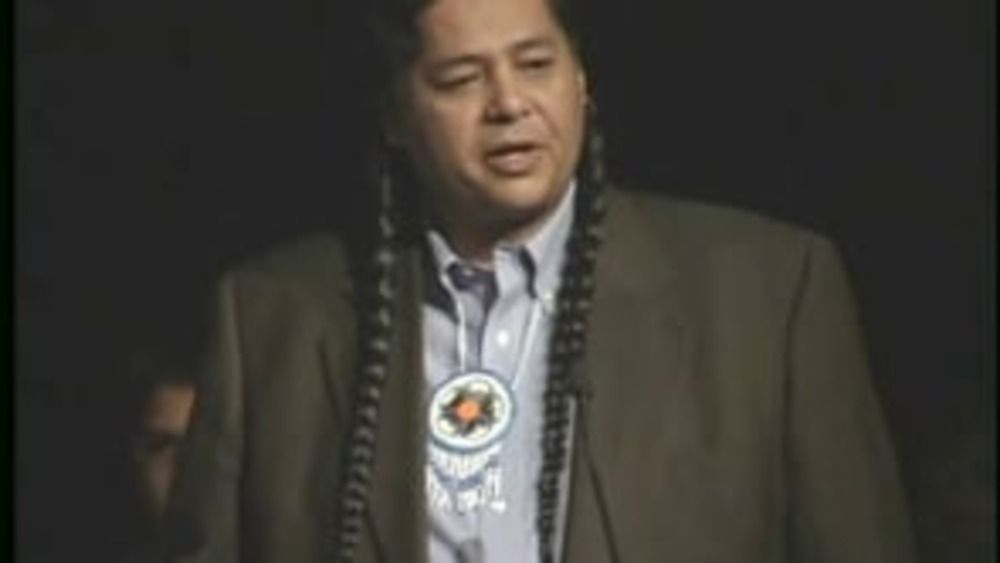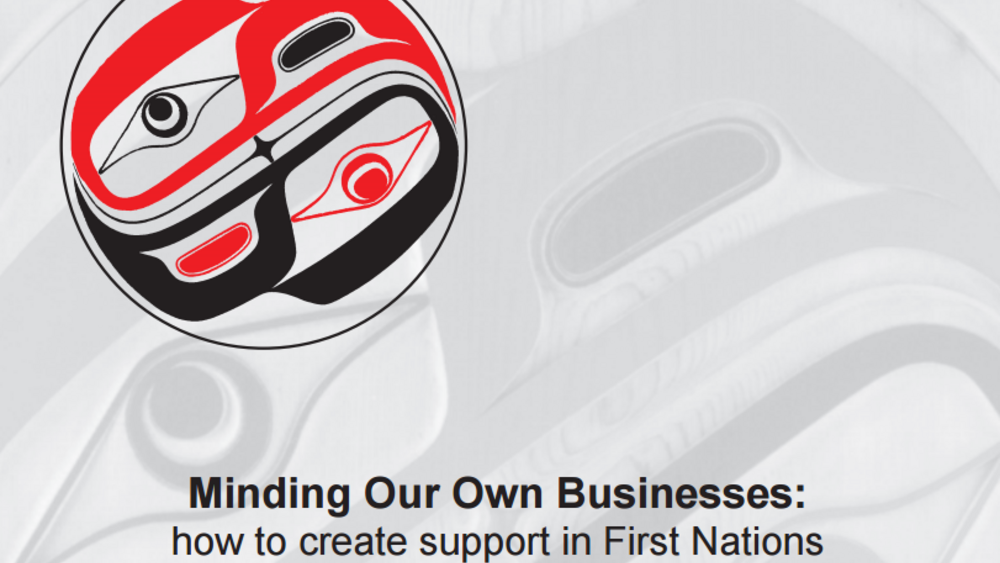This video -- produced by the Little River Band of Ottawa Indians -- depicts the Band's efforts to implement a work readiness and job training program for teenagers and young adults. Five years ago, the Band’s planning and education departments joined forces to create the Migizi Business Camp for tribal youth. For six days, students are taken off the reservation to learn business development concepts and build entrepreneurial skills. They complete business plans and present their ideas to a panel of judges. The Camp represents a conscious effort by the tribal government to involve its younger citizens in the effort to build an economic future for the nation.
Additional Information
Little River Band of Ottawa Indians. "Migizi Business Camp." Lessons in Nation Building, Honoring Nations, Harvard Project on American Indian Economic Development. Little River Band of Ottawa Indians. Manistee, Michigan. 2005. Film.
This Honoring Nations "Lessons in Nation Building" video is featured on the Indigenous Governance Database with the permission of the Harvard Project on American Indian Economic Development.
Transcript
[Music]
The Little River Band of Ottawa Indians presents
The Migizi Business Camp 2005
Interviewer:
“Just say, put Dr. Stickney.”
Florence Stickney:
“Will you stop it, just Florence Stickney. I mean, come on, I was Florence Stickney before I could give anybody an aspirin.”
Florence Stickney:
“These are high-energy kids. They’re very bright, very high energy. This year it was unbelievable, it was phenomenal. I think that there was the beauty of the setting itself, the fact that they had archery, they had an opportunity to see a rodeo, there was horseback riding, there were so many activities along with the water slide and the swimming.”
Amber Shepherd:
“My name is Amber Shepherd and I’m from Ludington, Michigan. This year we are staying at Double J Resort in Rothbury, Michigan.”
Student:
“Horseback riding was a lot of fun. I thought I was going to get bucked off, but I stayed on pretty good.”
Daisy Walters:
“My name is Daisy Walters and I’m from Sparta, Michigan. I’ve had a lot of fun on the first couple days of camp and I’m glad I decided to come here.”
Mark Sagi:
“My name is Mark Sagi. The resort is beautiful. They’ve got pools and horseback riding. The rodeo was fun yesterday.”
Florence Stickney:
“Because we were dealing with such young children where they need activities all the time,you know, some sort of a diversion. And I think the kids really had a wonderful time and they,they really paid better attention in that environment.”
Amber Shepherd:
“If you’re a newcomer to the business camp, have your mind open to new ideas that you haven’t been introduced to yet.”
Ann Harrison:
“I am Ann Harrison and I’m from Sturgeonville, Wisconsin. A good business person, like they have to have a good attitude because if they have a bad attitude then their business won’t make it. They can’t say like, ‘I’m going to fail, nobody’s going to buy my product,’ because with that attitude, then nobody will. The most difficult subject was the like math, the COGS [cost of goods sold], the profit you make, because it’s very confusing.”
Student:
“The cost of goods sold is what all the supplies, the price of all the supplies added together and that took to make that item and you subtract that and you come to your profit.”
Raquel Cole:
“Raquel Cole, Scottville, Michigan. You go to class usually from early in the morning around 8:30-ish until probably 8:00 at night, 9:30. It’s kind of hard and you kind of start to get irritated, but then it’s like you get to hang out with people and meet new people.”
Zachary Split:
“I’m from Massey, Michigan and my name is Zachary Split. Right off the bat you need to crack down, you need to write some notes because if you don’t, then you’ll be left behind and when you’re left behind with notes from yesterday and trying to catch up today, it’s really hard. You can stay up like until 1:00 in the morning if you don’t have a business plan, rewriting your rough draft and your final draft like I did last year.”
George Lawrence:
“I’m George Lawrence and I’m from Free Soil. I get up about 6:00 in the morning and go to bed at about 1:00 or 12:00.”
Interviewer:
“What do you think of your first couple days of camp?”
Ann Harrison:
“It was hard at first, but as it went on, it got more fun and not as hard.”
Gabe Santos:
“My name is Gabe Santos and I’m from Muskegon, Michigan.”
Interviewer:
“If you had advice for other campers in the next,in the future, what would it be?”
Gabe Santos:
“Don’t slack off because you always have to catch up really, really quick at the end if you slack off. Just do your work when you’re told and listen to Bridget.”
Interviewer:
“That one we should play over and over.”
Gabe Santos:
“Listen to Bridget. Listen to Bridget. Listen to Bridget.”
Raquel Cole:
“And you have different abbreviations for a bunch of things.”
Gabe Santos:
“Yeah, USAIR,utilities, salaries, advertisement, interest and rent. Rent’s the most important. Rent’s the most important one, because it’s a constant thing and it goes up and down all the time.”
Florence Stickney:
“And the quality of the kids because we have a number of repeat performers, they get better and better. They know the material, we see them growing up before our eyes, they’re more focused, they sort of know what they want and I can see them building bigger dreams for themselves.”
Mark Sagi:
“My financial statements are doing good so far, but the business plan, like Zach said, he stayed up until 3:00 in the morning doing his and I don’t want to do that, so I’m going to get done.”
Elise Moore:
“My name’s Elise Moore and currently I’m living in Ravenna, Michigan. Yeah, today was Saturday. It was the only day and the first day we get to go shopping. We got $78 to spend on our supplies that we needed.”
Zachary Split:
“What we do is that we go to a store like three, four days before the trade show, buy whatever we need, goods, cards, anything, flowers, you can make beads, homemade stuff, food.”
Florence Stickney:
“When they go to college, they will know a lot more about business and entrepreneurship than most incoming freshmen do on any major campus.”
Raquel Cole:
“It helps you in school actually like in economics and stuff it does help you if you know what you’re doing more and it makes you sound smart too. The fixed cost, the variable cost and the different costs that you have while you’re in business, you talk about your target customer and who that you want to buy your stuff.”
Florence Stickney:
“When I first developed this program, I called it the Eagle Camp, eagle being that that symbol in Native American culture, it soars, it’s strong, it’s powerful, it’s free. When I talked with the economic developer at the time, he said, ‘Well, the word in Ottawa is 'Migizi'.’”



